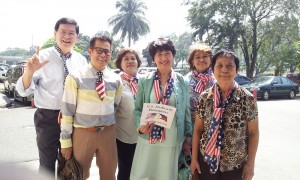Chasing a Fil-Am retirement dream of Medicare portability

In front of US Embassy on Roxas Boulevard (left to right): Eric Lachica, Rusty Francisco RN, Lily Chan RN, Daisy Tucay RN, Susan Jimenez RN and Lourdes Ceballos of Nevada of US Medicare PH advocacy organization. PHOTOS BY ERIC LACHICA
First posted in PositivelyFilipino.com
LAS VEGAS–After 30 years, Ely Barros thought it was time to end the chase for the American Dream and go back home.
The kids are grown, and a failed marriage is just a painful memory—there is no sense staying in the United States anymore.
The town of his birth with its swaying palm trees, white beaches, blue-green waters and golden sunsets, invitingly beckon. And finally, a luxurious, if not peaceful retirement is possible.
A new love who’s a lovely woman, a townmate, by his side makes the prospect of going home ever more tempting. Home is Borongan, Easter Samar, a town by the Pacific Ocean that miraculously escaped the wrath of super typhoon Yolanda.
Article continues after this advertisementThere is just one serious catch: In January, after 11 years, his transplanted kidney gave way. He has to go on dialysis again.
Article continues after this advertisementLack of coverage
Without private insurance and simply relying on Medicare, going back home and getting the treatment in the Philippines is an iffy and potentially expensive proposition.
Barros is one thousands of Filipino-Americans, estimates say as many as 200,000, who are planning to retire in the Philippines but are prevented from doing so mainly by the lack of medical coverage.
A proposal is under way to extend Medicare coverage to the Philippines, and several topnotch hospitals there are willing to provide medical services as well as doctors associations.
“This would be a tremendous help,” Barros says. “It would finally fulfill my dream of going back home for good.”
But after more than three years, the quest for a portable Medicare, which started with the formation of the U.S. Medicare Philippines, still has a long road ahead.
Medicare is a federal program that provides medical coverage to U.S. citizens 65 and older. It also extends coverage to younger people with Lou Gehrig’s disease, permanent disabilities and end-stage renal health complications.
A drug prescription benefit was added to hospital and doctors coverage during the George W. Bush presidency.
In addition, Part C or Medicare Advantage that provides both basic and extra healthcare services are offered by private health maintenance organizations (HMOs).
Also there are Medigap plans to supplement what original Medicare does not cover. Private insurance companies offer them.
However, coverage outside the United States is not allowed unless in an emergency situation and an American hospital is not available.
Lobbying
The lobbying effort for a portable Medicare is centered on the premise that it’s a win-win situation; that allowing retirees to bring their Medicare benefit to the land of their birth will save the U.S. tons of money.
“The average cost per beneficiary was $11,743 per year in 2010,” says Eric Lachica, a co-founder of U.S. Medicare Philippines. “A savings of at least $5,000 per beneficiary is achievable if spent in the Philippines.”
If 200,000, a conservative estimate because at least 100 of the four million Filipino-Americans in the U.S. retire every day, chose to return to the Philippines, that would result in $1 billion savings to Medicare every year.
This relieves pressure on Medicare, which is expected to go bankrupt in 12 years, according to some studies, Lachica says.
A couple of precedents give Lachica and his group hope that eventually the U.S. Congress will pass a law that allows Medicare portability.
Precedents
In 2010, Saipan and Guam were allowed critical medical treatment in Philippine hospitals that meet Joint Commission International standards.
Patient expenses were reimbursed by Medicare or by private insurance plans. Tricare, the Department of Veterans Affair’s health plan, reimburses U.S. military retirees who live in the Philippines for their medical expenses in certain designated hospitals.
Additionally, Philippine President Benigno S. Aquino III has vowed to bring up Medicare portability in his talks with President Obama in April when the American president finally visit the country after canceling his trip last year.
Lachica’s group has built a partnership with several hospitals, doctors groups and nurses associations, aside from community groups, to help in the lobbying to advance the Medicare portability efforts.
On Jan. 16, it launched its 2014 campaign at the Nurses Global summit at the Manila Hotel.
Attended by more than 300 nurses and supporters, the gathering was graced by Nurses Association of America (PNAA) President Victoria Navarro RN, Secretary Imelda Nicolas of the Commission on Filipinos Overseas (CFO), Sec. Enrique Ona M.D. of the Department Health (DOH) and Gen. Manager Vernie Atienza of the Retirement Authority (PRA).
“We appealed to the nurse leaders and our partners to renew their commitment to the cause of Medicare Portability for thousands of returning elderly Filipino Americans by ensuring high quality health standards and by keeping low medical costs in the homeland,” Lachica says.
“We urged them to persuade US Medicare Advantage insurance companies to provide full emergency coverage for our retirees here and to build confidence in doing business with the top hospitals and their doctors,” he adds.
Consultations
The advocacy group later consulted and talked strategy with the Retirement & Healthcare Coalition, formed by the four influential foreign chambers of commerce (American, European, Japanese and Korean).
The group, which included Daisy Tucay of Virginia, Lily Chan of Maryland, Susan Jimenez of Texas, Rusty Francisco of Florida, Lourdes Ceballos of Nevada and Lachica also met with U.S. ambassador Philip Goldberg and his economic affairs counselor at the U.S. embassy.

Dr Joanne Cosin, (left) Patients Services Director of Cebu’s internationally accredited Chong Hua Hospital, renews their promotional partnership agreement with Eric Lachica (center), organizer of US Medicare PH as the hospital’s legal counsel Dean Decal looks on.
They discussed the challenges and prospects of extending long-term Medicare coverage to US citizens who visit and retire in the Philippines.
They told Ambassador Goldberg their 2014 goal to obtain a Philippine healthcare industry study of the past year’s cost savings experience. It would include the quality of care provided US military retirees in TRICARE PH program and the 30,000 Guam Medicare American beneficiaries who can be treated at top Philippine hospitals at negotiated low charges.
Goldberg, in turn, expressed interest in the idea, considering that about 400,000 Americans live in the Philippines.
The group will also visit Cebu and Iloilo and meet partners there.
Support from hospitals
So far, Philippine hospitals that have signed up as partners are The Medical City, Cebu’s Chong Hua Hospital and Cebu Doctors Hospital. There are ongoing negotiations with Ayala Land, St. Luke’s Hospital, Makati Medical Center and Cardinal Santos Hospital.
If the Medicare portability is a long road full of obstacles, Lachica is unfazed.
A political science graduate of the University of Southern California and a son of a Fil-Am World War II veteran, Lachica worked 17 years for the passage of the Fil-Am Veterans Equity Bill that resulted in the 2010 release of $300 million for Fil-Am vets and their families.
In addition, thousands of veterans acquired U.S. citizenship, many of whom, ironically, want to return to the Philippines, hopefully with Medicare coverage. Just like Barros.
“There are enough reasons to remain in the United States,” Barros says with a tinge of sadness. “My kids are here and my grand kids are still growing up. It would be nice spending time with them.”
But with growing old and long-term care a looming possibility, it still seems more practical to spend retirement in the Philippines.
“I hope this effort to make Medicare portable succeeds—and soon,” Barros says with obvious sincerity. “I don’t have much time left, I think, and there’s nothing better than spending the rest of my days in the land of my birth.”
To read more stories on the Filipino diaspora, go to PositivelyFilipino.com .
Like us on Facebook